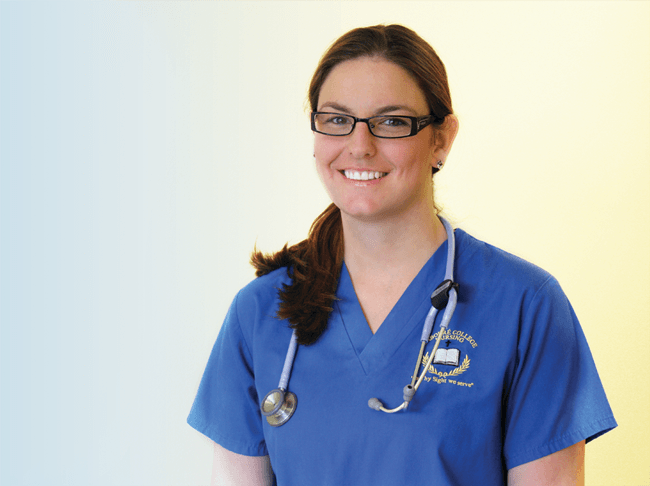Are you looking for a career change? Would you like to leave work each day knowing you made a difference in someone’s life? Maybe you’re looking for job security or the opportunity to learn and grow in a satisfying career.
If you’re looking for a life-enhancing career, a job in healthcare may be just what you’re searching for. Be a light in for people facing their darkest days, gain job security, and challenge yourself with career advancement opportunities through one of the many pathways to a healthcare career.
In this article, we explore why now is a great time to embark on a healthcare career path, how you can get started working in healthcare with less than six months of training, and how career growth is possible for healthcare workers, no matter where your journey starts.
It's a Great Time to Pursue a Career in Healthcare
As the world emerges from the grip of the pandemic, we are still reeling from business closures and lost jobs. But the healthcare industry stood strong through the storm and is carrying on with business.
Job Security
The U.S. Department of Homeland Security considers workers who provide public health services, including those employed in healthcare jobs, as essential critical infrastructure workers. This means the services that healthcare workers provide are vital to the health and well-being of the public.
And this is why healthcare workers were in demand during the COVID-19 pandemic.
The healthcare industry suffered from staffing shortages before COVID, which worsened as hospital admissions climbed. Almost overnight, the world realized that we need healthcare workers during the best of times and during the worst of times.
Even as some industries were all but shut down, healthcare facilities hired record numbers of staff and travel healthcare professionals to fill vacancies.
While the pandemic may be officially over, the staffing shortages remain. And the healthcare industry continues to add jobs, making healthcare one of the hottest job markets in the U.S.
The U.S. Bureau of Labor Statistics predicts that for the next eight years, there will be 1.9 million healthcare job openings each year due to both new jobs being created and the need to fill vacant positions. The number of new jobs in healthcare is expected to expand by 13 percent through 2031, placing healthcare job growth much higher than the average growth for all jobs.
While a job in healthcare can provide security and stability, many people have a deeper reason for pursuing a career in healthcare.
Job Satisfaction
Some people pursue a healthcare career because they love helping people. Others suffered from a serious illness or injury and decided to pursue a career in the very industry that saved their lives.
Maybe you feel incredibly fulfilled when you make a difference in the life of another. Perhaps your mission is helping others. No matter your why, a healthcare career can satisfy a deep need to help others.
A job in healthcare can also help you maintain a healthy work-life balance. Since medical care is available 24/7, facilities may offer flexible scheduling options for some roles.
Maybe you prefer to work longer shifts and have more days off. Or you might want to work weekends only so that you can continue your education, pursue a side business, or care for a family member during the week.
The best jobs in the healthcare industry for you might be the ones that offer the most flexibility for every season of life.
Options and Opportunities
You don’t need a four-year college degree, or even a two-year associate degree, to become a healthcare professional. In fact, there are many entry points to a career in healthcare. If you’ve never attended college, have a few college credits, or already have a degree, a pathway to a career in healthcare exists for you.
No matter where you start your healthcare career journey, you'll have options to continue your education and advance your career.
Certificate Programs Open Doors
In as little as 14 weeks, you can earn a health science certificate and be on your way to an exciting career in healthcare.
Labouré offers health science certificate programs in electrocardiography (EKG) and phlebotomy.
After completing the program of your choice, you can choose to pursue licensure, transfer your credits toward an associate degree, complete a different certificate program, or just enjoy your new career as a healthcare professional.
Don’t like blood? The EKG certificate program might be for you. Learn to conduct non-invasive tests that measure the heart’s electrical activity, giving the provider valuable information on how well a patient’s heart is functioning.
The phlebotomy certificate program teaches students to draw blood from patients for diagnostic testing. Phlebotomy technicians, or phlebotomists, may also work for blood banks, collecting life-saving blood donations.
Many people do not like having their blood drawn. A skilled phlebotomist with stellar people skills can make a blood draw much less stressful.
If you already have some college credits, a neurodiagnostic technology (NDT) certificate can start you off in the exciting field of neurological diagnostic testing. A neurodiagnostic technician conducts procedures and tests - primarily the electroenchephalogram or EEG - that help doctors diagnose neurological conditions.
Once you complete the NDT certificate program, you’ll be eligible to take the national EEG credentialing exam. This credential establishes you as a professional who is committed to ongoing education in the field of neurodiagnostic technology.
The NDT certificate can be a first step in the pursuit of a certificate in intraoperative neuromonitoring (IONM). The IONM certificate program prepares students to monitor a patient’s brain waves or other neurological activity during surgery. This program requires incoming students to possess the NDT certificate, previous IONM experience, or a college degree.
An Associate Degree is Next Level
Labouré offers several associate degree options and you can start earning your way toward a two-year degree by taking advantage of a certificate program.
The credits earned from certificate programs at Labouré count toward the credits needed to earn an Associate of Science in Health Science. Earning specialty certificates while pursuing an associate degree can open the door to further career advancement and higher-paying positions.
Or if you already have experience in healthcare and want to further your education and earning potential, pursuing an Associate of Science in Health Science can help you reach your goals.
A health science associate degree can help you pursue such career avenues as:
- an advanced position in your certificate field, such as a lead EKG technician,
- a medical office specialist, or
- a health unit coordinator.
If you can see yourself taking an active part in helping cancer patients during their treatments or in helping patients with lung problems breathe a little easier, Labouré offers associate degree programs in radiation therapy and respiratory care.
Radiation therapy students learn about cancer and how radiation is used to shrink tumors. If you long to help people during times of stress, an associate degree in radiation therapy can help you achieve that goal.
Or maybe you’re looking for maximum flexibility in where you work and think you would like to help people with acute or chronic breathing problems. Labouré’s respiratory care program can help. Respiratory therapists (RTs) are employed in a variety of healthcare facilities, from hospitals to clinics to nursing homes. RTs perform diagnostic lung performance tests, administer breathing treatments, and use oxygen delivery systems to help people breathe better.
Labouré also offers a two-year Associate of Science in Nursing (ASN). After earning an ASN, you can qualify to take the national NCLEX exam and become licensed as a registered nurse (RN) in your state.
If you’re already a licensed practice nurse (LPN), consider Labouré’s bridge program to become an RN. As an LPN, earning your ASN can take as little time as one year.
Bachelor's Degree Programs Offer Advanced Opportunities
If you’re an RN and want to further your career options, consider enrolling in the RN-to-BSN (Bachelor of Science in Nursing) program. Your skills and previous education can set you on your way to earning your BSN in as little as 16 months.
Or maybe you have some college credits or an associate degree in a healthcare field but want to pivot and pursue a career in healthcare administration. Labouré offers a Bachelor of Science in Healthcare Administration that can open the door to a job in medical office management, such as a practice administrator or long-term care manager.
A job in healthcare can provide security, the satisfaction of helping others, and the opportunity to pursue further education and advance your career. The healthcare industry offers an array of entry points, accommodating different levels of education and work experience. Online, hybrid, and part-time education programs make it possible for almost anyone to pursue a job in healthcare.
Learn more about how Labouré can help you enter the healthcare field. Explore our programs and then contact an admissions expert to start your healthcare career journey and make your dream job a reality.
Ready to get started?






Comments